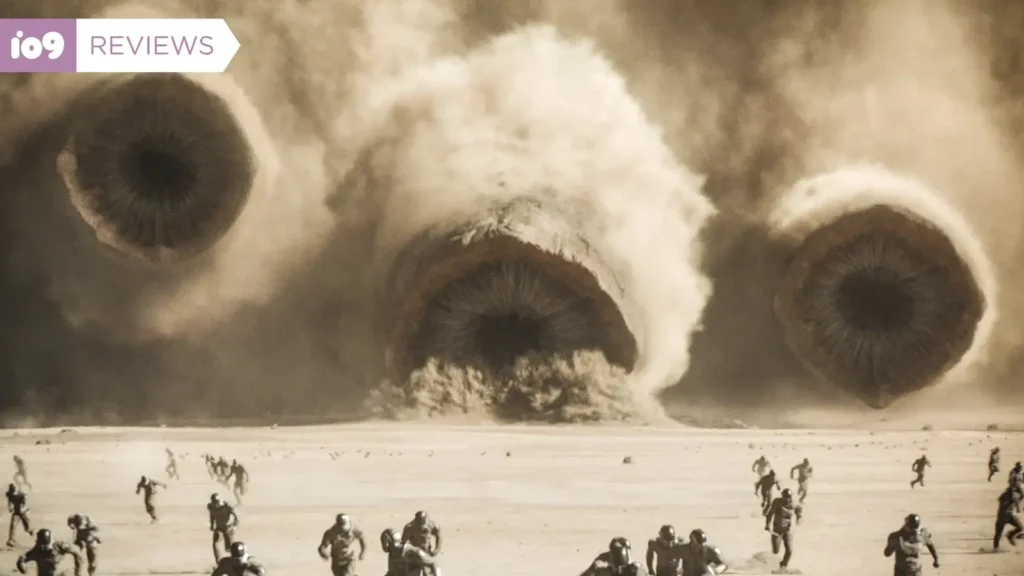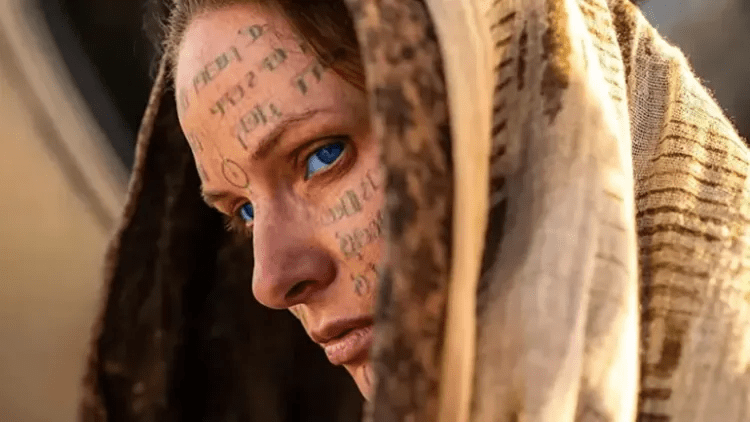Analyzing the Conclusion of Dune Part 2 From Departure to Destiny
In “Dune: Part 2,” director Denis Villeneuve takes a slightly different path from Frank Herbert’s original novel, setting the stage for the next installment, “Dune Messiah.”
As the 166-minute runtime of “Dune: Part Two” draws close, pivotal events unfold rapidly, some diverging from the source material. Let’s pause to dissect these developments and speculate on their implications for a potential third film.
Paul Atreides (Timothée Chalamet) flawlessly executes his strategic assault on the Emperor (Christopher Walken). Despite the formidable reputation of the imperial troops, known as Sardaukar, they succumb to the Fremen and their sandworms. The advantage is further tilted by House Atreides’ deployment of atomic weapons.
In the universe of Dune, each noble house possesses a nuclear arsenal, although their use against one another is forbidden. Paul ingeniously circumvents this restriction by employing atomic weapons to dismantle the fortifications surrounding Arrakeen, facilitating the sandworms’ passage. Additionally, Paul takes the life of Baron Vladimir Harkonnen (Stellan Skarsgard), a deed typically carried out by his sister Alia in Frank Herbert’s original novel.
Also Read: Dune Part 2 Cast Reveal Secrets of the Arrakis Saga.
However, when Paul moves to confront the Emperor for aligning with House Harkonnen against House Atreides—an egregious transgression in the Dune universe, as the Emperor and his Sardaukar are expected to remain neutral in inter-house conflicts—Feyd-Rautha Harkonnen (Austin Butler) intervenes. Similar to Westeros in Game of Thrones, Dune’s world upholds a tradition of honor duels, wherein a challenged individual may nominate a champion to fight in their stead. Thus, Feyd-Rautha duels on behalf of the Emperor, wielding the Emperor’s own blade, albeit with futile outcomes.

These developments set the stage for an uncertain future, brimming with political intrigue and potential conflict, should a third installment of the saga materialize.
The long-standing feud, known as “kanly,” between House Atreides and House Harkonnen finally reaches its conclusion with a decisive victory for the Atreides. However, the genetic bloodline of House Harkonnen is preserved by the Bene Gesserit through Lady Fenring’s pregnancy.
Related Content:
Anya Taylor Joy confirms secret Dune Part 2 role. She says it’s a dream come true.
The Spectacular New Dune Will Turn Even Skeptics Into Believers
“Dune: Prophecy” Discover All You Need To Know About.
Following the downfall of Feyd-Rautha, events take a divergent path from the book. Paul and Princess Irulan, the Emperor’s daughter (played by Florence Pugh), agree to a marriage arrangement that secures Paul’s ascent to the galactic throne and spares the former ruler’s life. This decision raises questions about the fate of Paul’s Fremen lover, Chani (Zendaya). While in Herbert’s novel, Chani remains by Paul’s side and bears his children despite his marriage to another woman, in Denis Villeneuve’s film adaptation, Chani leaves abruptly. The film concludes with her summoning a sandworm to carry her away to parts unknown.

Meanwhile, the other Great Houses are discontent with Paul’s rise to power. However, despite their amassed armada, they are unable to assail Paul on Arrakis. Paul’s use of atomic weapons serves not only to dismantle fortifications but also as a demonstration of his capability to destroy Arrakis’s spice supply, the sole source of the vital melange in the universe. Consequently, the noble houses find themselves on the defensive as Paul dispatches his Fremen legions across the universe to quell opposition.
This marks the beginning of the “holy war,” referred to as “jihad” in Herbert’s novel, foreseen by Paul in his disturbing visions. While initially seeming justified in retaliating against the Harkonnens, Paul now faces the grim reality that countless innocents will suffer the consequences of his actions. Many millions who had no involvement in the tragedy that befell Paul’s family will pay the ultimate price.
Paul’s manipulation of the Fremen is just as heartbreaking. He ascended to their leadership as the “Lisan al-Gaib,” promising to fulfill their dream of transforming Arrakis’s deserts into a lush paradise. However, his ultimate command to “take them to Paradise!” takes on a sinister meaning. Instead of leading the Fremen to their envisioned utopia on Arrakis, Paul is now guiding them and his adversaries to the afterlife.

While Stilgar (Javier Bardem) and others passionately embrace this violent crusade, the original intent has been twisted into something dreadful. Rather than realizing their dreams of prosperity, the Fremen are unwittingly swept into a conflict with fatal consequences.
However, don’t anticipate witnessing this war on screen just yet. While a third Dune film hasn’t been formally announced, Villeneuve has expressed his desire to adapt Herbert’s follow-up novel, Dune Messiah. By the time that narrative unfolds, Paul will have solidified his grip as the universe’s dictator, albeit at the cost of accumulating numerous foes. The struggle will transition from the battlefield to clandestine chambers of conspiracy, with rebellion simmering even closer to home, particularly if Chani has her say.
Villeneuve sheds light on Herbert’s intentions, noting that Dune was meant as a cautionary tale rather than a glorification of charismatic leaders. Herbert’s subsequent novel, Dune Messiah, serves as an epilogue, underscoring the tragic nature of the narrative. Far from a triumph, the story serves as a sobering reminder of the perils of unchecked power and the consequences of hero worship.
Chani’s Departure:
In the film, Chani, portrayed by Zendaya, exits in a way that diverges from the novel. Instead of marrying Princess Irulan for political reasons while keeping Chani as his concubine, Paul Atreides chooses to be with Chani. This decision directly leads into the plot of “Dune Messiah.”

“Dune Messiah” picks up over a decade later, with Paul and Chani attempting to produce an heir to the Atreides bloodline.
Foreshadowing the Tragedy:
The film hints at the events to come. In “Dune Messiah,” Chani gives birth to Paul’s twin children: Leto II and Ghanima.
Tragically, Chani dies during childbirth, remaining loyal to Paul until the very end. This pivotal moment shapes the subsequent narrative and sets the stage for the next chapter in the “Dune” saga.
Conclusion of Dune Part 2
As “Dune: Part 2” concludes, the torch passes to the next generation. The twins, Leto II and Ghanima, inherit their parents’ legacy and face their own challenges in a universe fraught with political intrigue, power struggles, and mystical forces.

The tragic loss of Chani reverberates throughout the story, impacting the fate of the Atreides dynasty and the destiny of the desert planet Arrakis.
“Dune: Part 2” leaves us with a sense of anticipation, knowing that the journey is far from over. As fans eagerly await the next installment, the epic tale continues to unfold, blending science fiction, politics, and timeless themes of heroism and sacrifice.
“Dune: Part Two” is currently showing in theaters.










